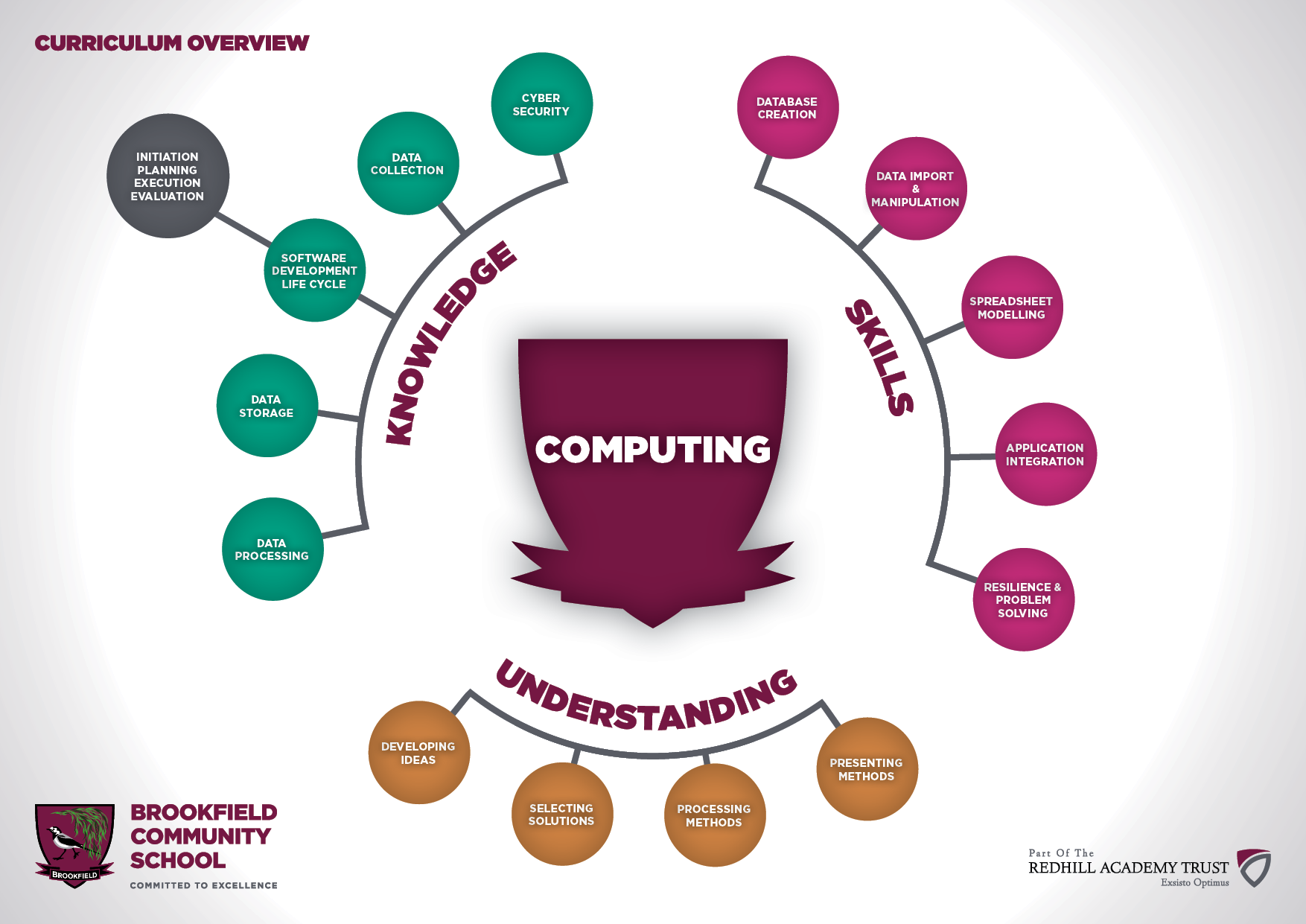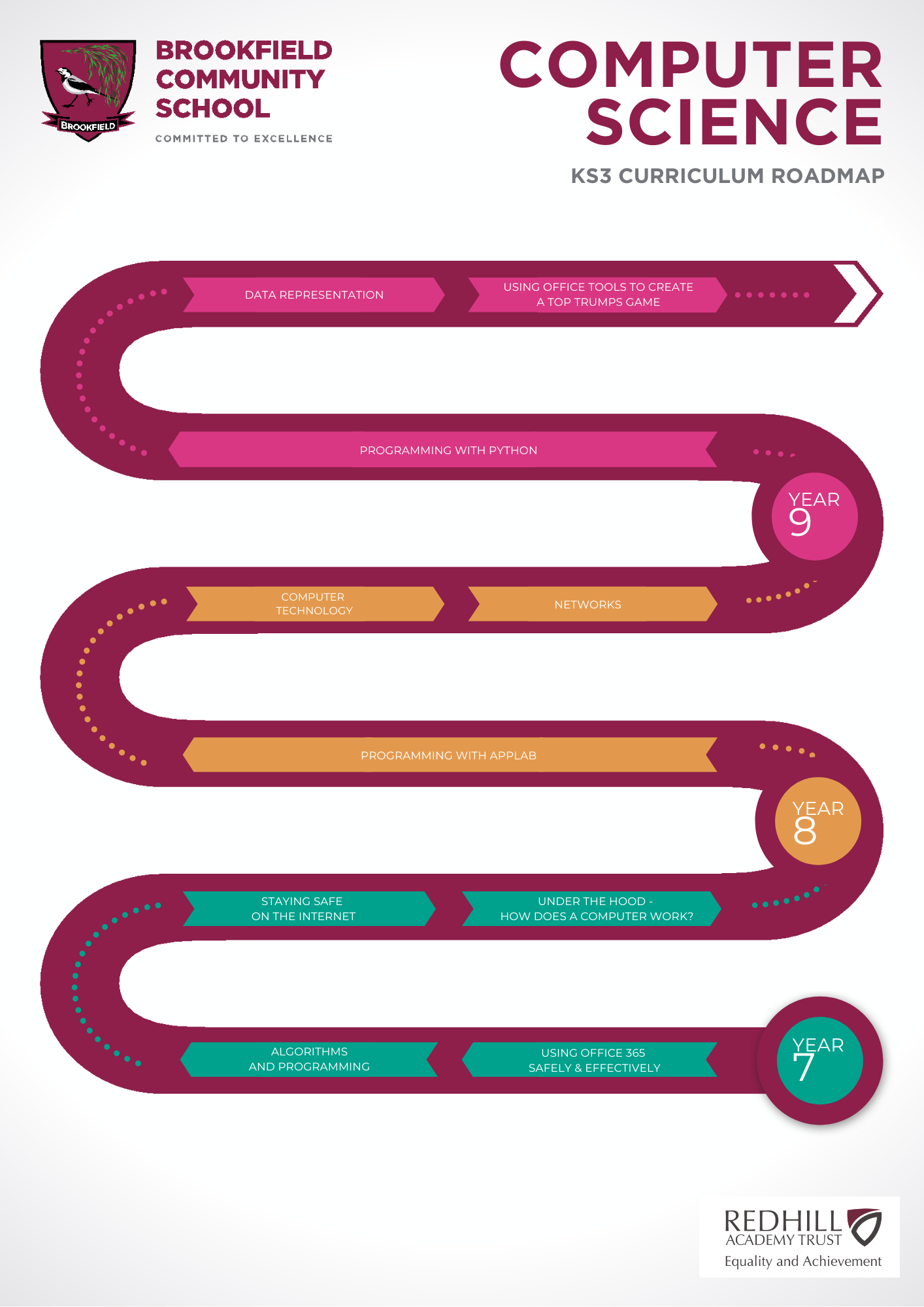Computer Science
 Click image to view full size.
Click image to view full size.
Introduction to Computer Science
Computer Science / IT is taught as a standalone subject at KS3 in Years 7 to 9 where students follow a detailed scheme of work linked to the current programme of study. This subject is mainly concerned with how computers and computer systems work, how they are designed and programmed, how to apply computational thinking and how to make the best of information technology. We aim to give students a broad education that encourages creativity and equips them with the knowledge and skills to understand and change the world.
There are three distinct strands which are complementary to each other: computer science, information technology and digital literacy. Each component is essential in preparing pupils to thrive in an increasingly digital world, where current employers require different skill sets depending upon the nature of the role the employee will be studying.
E-Safety is also very important to everyone and is something that we revisit regularly with students, this is introduced throughout the topics in the year and also is taught as reminders throughout the Life 360 programme here at Brookfield Community School.
Computer Science offers what can only be described as unimaginable opportunities and is constantly evolving. Access is currently becoming universal and increasingly mobile with students using technology from an early age. As a result, we are committed to delivering an age appropriate curriculum that enables our students to become responsible digital citizens who are aware of the dangers online and know what to do if they encounter this.
At KS4 students are also offered the option of studying either Cambridge Nationals Level 1 / 2 in Information Technologies course or OCR Computer Science GCSE.
Computer Science is programming, whereas the ICT course at KS4 is a vocational course that looks at the skills that employers require in the everyday workplace. It is possible to study both subjects as an option if students have a very clear goal of only working in the IT industry after leaving your education or further training.
At KS5 students study the H446 OCR A Level course in Computer Science.
The Computer Science department is passionate about helping students to reach their full potential and our goal is to ensure that all students have the resources, knowledge, skills and understanding to progress to the next stage in their educational journey.
Key Stage 3
In Key Stage 3 students are taught for one hour every 2 weeks in their respective groups.

Key Stage 4
Cambridge Nationals Level 1/2 Information Technologies.
Exam Board: OCR
The Course
Cambridge National in Information Technologies improves students’ knowledge of the digital environment and their confidence with IT. They learn about data management issues and develop practical skills by planning and creating an integrated technological solution to communicate information.
How are students assessed?
Students are assessed via an exam and coursework which can be undertaken at different times throughout the course. Both the exam and the coursework are equally weighted.
A vocational qualification that benefits many career choices as the coursework allows you to develop transferrable and highly sought after skills:
- Lawyers, architects, mechanics, people working in medicine, people owning their own business
- Learn about how to build systems to store, manage and manipulate all the information organisations keep on people/products/orders
- Learn about cyber security and how to combat it, wearable technology, tracking individuals, selecting appropriate software to do a specific task, robots and much, much more.
GCSE Computer Science
Exam Board: OCR
The Course
Computer Science is engaging and practical, encouraging creativity and problem solving. It encourages students to develop their understanding and application of the core concepts in computer science. Students also analyse problems in computational terms and devise creative solutions by designing, writing, testing and evaluating programmes.
Component 01: Computer systems
This unit introduces students to the central processing unit (CPU), computer memory and storage, data representation, wired and wireless networks, network topologies, system security and system software. It also looks at ethical, legal, cultural and environmental concerns associated with computer science.
Component 02: Computational thinking, algorithms and programming
In this unit students apply knowledge and understanding gained in component 01. They develop skills and understanding in computational thinking: algorithms, programming techniques, producing robust programmes, computational logic and translators.
Practical programming
Throughout the course, students are to be given the opportunity to undertake a programming task(s) during their course of study which allows them to develop their skills to design, write, test and refine programmes using a high-level programming language. Students will be assessed on these skills during the written examinations.
This course will encourage students to:
- Understand and apply the fundamental principles and concepts of Computer Science, including abstraction, decomposition, logic, algorithms, and data representation
- Analyse problems in computational terms through practical experience of solving such problems, including designing, writing and debugging programmes
- Think creatively, innovatively, analytically, logically and critically
- Understand the components that make up digital systems, and how they communicate with one another and with other systems
- Understand the impacts of digital technology to the individual and to wider society
- Apply mathematical skills relevant to Computer Science.
How are students assessed?
Students are assessed via two exams at the end of the course. Both the exams are equally weighted at 50% each.
Key Stage 5
A Level Computer Science
Exam Board: OCR
The Course
This aim of this qualification is to enable the students to develop:
- Be able to use their understanding to apply the fundamental principles of computer science, including abstraction, decomposition, logic, algorithms and data representation
- The students will need to analyse problems in computational terms through practical experience of solving the problems including developing, testing and documenting programming projects
- The student’s will develop their analytical, logical and critical thinking skills throughout the course
- Students develop skills to see relationships between various aspects of computer science and mathematics
- This course will encourage learners to be inspired, motivated and challenged by following a broad, coherent, practical, satisfying and worthwhile course of study. It will provide insight into, and experience of how computer science works, stimulating learners’ curiosity and encouraging them to engage with computer science in their everyday lives and to make informed choices about further study or career choices.
The key features of this course encourage:
- A key emphasis on problem solving using computers
- A key emphasis on computer programming and algorithms
- A significant emphasis on the mathematical skills used to express computational laws and processes, e.g. Boolean algebra/logic and comparison of the complexity of algorithms
- This course has far less emphasis on ICT.
How are students assessed?
- 2 exams, which each account for one 80% of your A Level grade.
- The 2 exams last 2.5 hours and are worth 140 marks each.
- An in-depth programming project which accounts for 20% of the course – Completed in year 12/13
- The exams consist of a mixture of short answers and extended writing questions.
Enrichment
Throughout Year 7 to Year 13 we try to offer an extended list of trips to encourage students to take our Computing/ICT courses all the way through to sixth form.
Some trips that we offer include:
- Trips to the Museum of Computing in Milton Keynes
- Trip to Sheffield Hallam University Computer Science Dept
- Trip to Games Britannia – To encourage students to program the next computer game of application.
Progression Opportunities
There are many opportunities for our students to progress within in the Computing/ICT curriculum with students progressing to:
- University degrees in either ICT / Computer Science
- Many ICT/Computing jobs throughout a vast variety of industries from Aerospace to Engineering to
- Higher level apprenticeships including:
- Cyber intrusion analyst
- Cyber security analyst
- Data analyst
- Digital community manager
- IS Business analyst
- Network engineer
- Software developer
- Software tester
- IT Manager
- Database Specialist.
Any student or parent that is unsure on how they could progress is welcome to have a meeting with the Head of Computing/ICT to ensure that they are choosing the right course for their progression, this is particularly important around the KS4 Options and KS5 option time.

